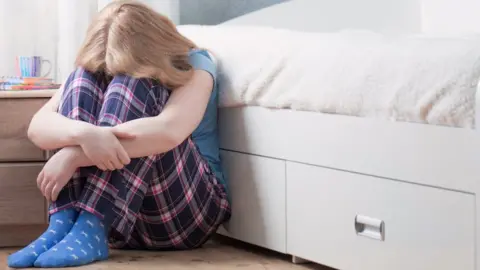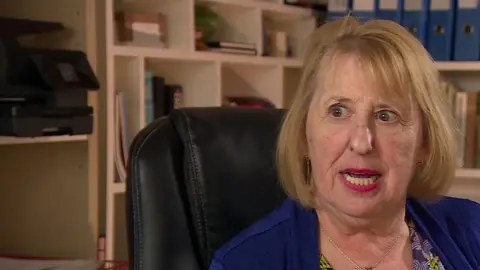Primary school mental health counselling may help economy, study says
 Getty Images
Getty ImagesMental health counselling for primary school pupils who need it could provide long-term benefits for the economy, a study by a charity has suggested.
Pro Bono Economics estimates that every £1 spent on one-to-one counselling could return society £6.20 in improving future job prospects and cutting crime.
More than a third of this would be government savings from higher taxes and less spending on public services.
The analysis recognised that some children would have recovered anyway.
The study looked at the improvement in the mental health of 4,548 pupils from 251 primary schools across the UK who had received one-to-one support from children's mental health charity Place2Be in 2016/17.
Higher earnings
It said that from its one-year investment of £4.2m, Place2Be's counselling service could deliver £25.9m to society by improving each child's long-term outcome.
The potential benefit per child was calculated at just over £5,500, of which £3,568 was attributed to their potential higher lifetime earnings and £2,050 to a lower government outlay in areas such as health and the criminal justice system.
Neil Pratt, chief economist at the charity Pro Bono Economics, told the BBC: "The evidence we looked at showed that early-years intervention of this kind can really change a child's later-life outcomes.
"We looked at improvements in their employment as adults, improvements in adult mental health, attendance at school... and then we took an economic view to make the benefit associated with those."
Andy Haldane, the Bank of England's chief economist and co-founder of Pro Bono Economics, said: "An estimated one in 10 children and young people in the UK have a mental health condition. Without effective intervention, these conditions can have a significant impact on their life chances and result in significant long-term costs."
Tom Madders, campaigns director at charity YoungMinds, told the BBC: "We know that half of all mental health problems first emerge before the age of 14, so investing in mental health support in primary schools can make a huge difference.
"But at the moment, as most teachers agree, the education system is unbalanced, with a far greater emphasis on academic performance than the wellbeing of students.
'Inspiring thing'
Sarah Kendrick, head of service for the south for Place2Be - where she has worked for 18 years - said they were working with children from age four to 16.
"We can intervene early in the life of a child, but also early in the life of any problems that come up. That's what's kept me here - it's an inspiring thing."

Sylvia Libson, executive head teacher of Oakington Manor Primary School in Wembley, told the BBC that while initially pupils might have mental health problems that often arise from family issues, as they get older it is more about friendships or going on to secondary school.
"Place2Be takes away from teachers having to deal with emotional issues constantly and parents can go to them and talk about issues that they have," she said.
"I want the government to recognise that schools need to be places of safety, and that schools need support in helping children in emotional issues that they encounter day-to-day."
'Positive impact'
Paul Whiteman, general secretary of school leaders' union NAHT, said that one in five children would experience a mental health difficulty at least once in their first 11 years. He also said many adults with lifetime mental health issues could trace the symptoms back to childhood.
"This research shows so clearly the positive impact early help can have, for individuals and for society," he said.
"It would be a sensible investment for the government to fully fund a universal rollout of mental health and wellbeing support in all schools."
A government spokesman said £300m had been allocated to provide additional resources for early mental health intervention for all schools - primary and secondary.
"We are also helping schools to intervene early by offering mental health first aid training for a member of staff in every primary and secondary school."
If you, or someone you know, have been affected by mental health issues, the following organisations may be able to help.
